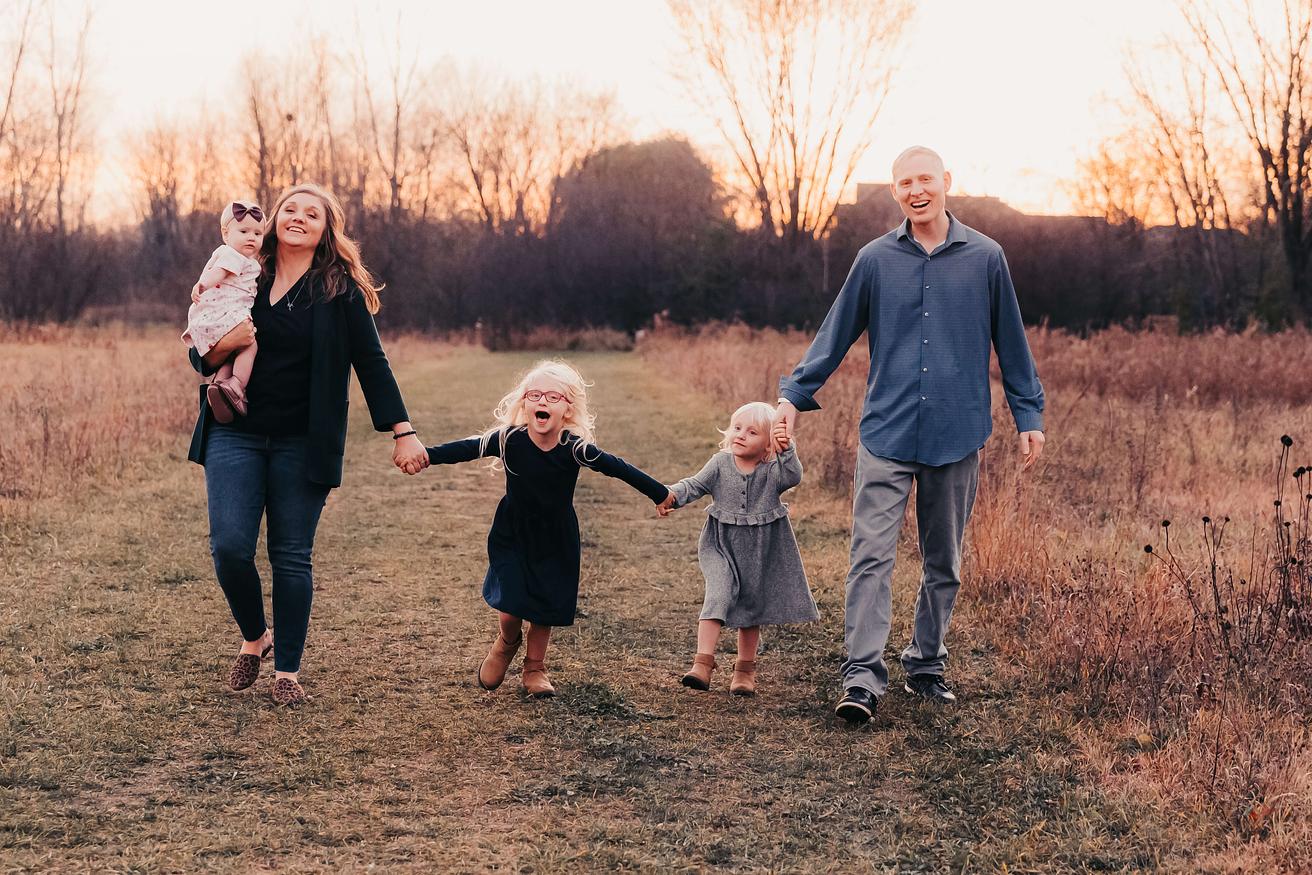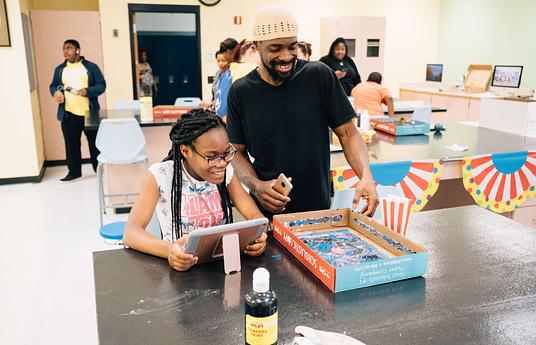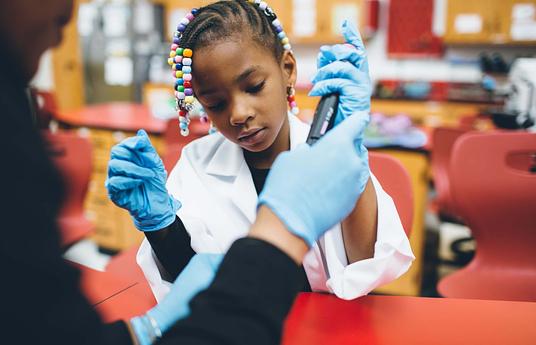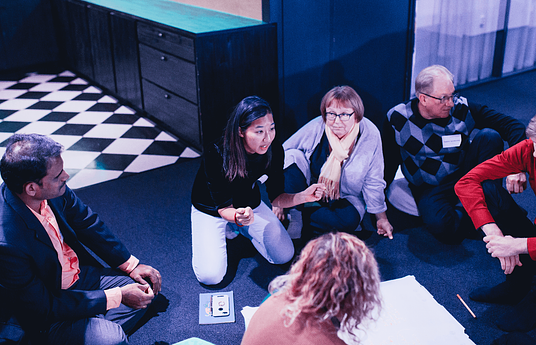HundrED Country Lead for the US, Nathan Strenge is based in Minneapolis, Minnesota, where he lives with his wife Amy and three daughters: Bea (6), Ellia (4), and Livia (8 months). He works full-time at Fielding International, where he helps schools around the world create reimagined learning environments that align with their local vision. He is also a co-founder of a new high school, Exploration High School, that opened in Minneapolis in September of this year.
What was the moment, realisation or a person that made you excited about education in the first place?
It was in conversations I was having with my older brother Dan during my early years in university. I had just finished cancer treatments, and suddenly I was searching for a more purpose-driven life. Dan shined a light on many of the inherent inequities and systemic shortcomings of our education system and encouraged me to go into teaching. Shortly after, I switched my majors from Business & Economics to Secondary Education & Mathematics, and it set me on a new life course.
”I enjoy going on walks (even in the cold), spending time with my family, playing Jackbox games, and contributing to a learner-centred education movement.”
I had a lot of success as a young high school math teacher who broke conventional rules in education, which opened many doors, including being approached in 2013 to create a new school. Dan and I spent over a year imagining the possibilities of what the new school could be until his untimely death at age 31 in December of 2014. Because of his influence on my life, I feel called to make a double impact for both of us. I carried Dan’s spirit with me to follow through on the school we started imagining many years ago -- Exploration High School -- which opened in 2021.
These collective experiences have ignited a life pursuit to transform education at scale so that every child has access to a human-centred and holistically supportive learning ecosystem that adapts to their unique gifts, needs, interests, and life experiences. We can design environments and cultivate learning experiences that respond to each student’s uniqueness, and in doing so connect them with opportunities to contribute to the world around them. To me, this is a deeply existential issue. With the problems facing humanity and our planet now and in the near future, we must unleash the unique gifts of every young person to make a difference - the stakes have never been higher.
Where do you see the biggest opportunities for innovators in your region?
There are so many different types of innovations that have been featured from the United States, it’s hard to loop them into a single category. The best way I can describe them is they are working to support a learner-centred paradigm in education. Innovations like the Global Oneness Project and Global Create-a-thon connect kids with authentic projects and challenges to make learning more relevant and impactful. Big Picture has created an innovative network of schools that has spread across the country, illuminating many learner-centred possibilities. Innovations like Shadow a Student and Remake Learning Days have looked for creative ways to spur demand to transform education. From my perspective, we need to cultivate more innovations in three categories:
- Innovations developed by youth
- Innovations that reach broader audiences
- Innovations that connect kids with community difference-making.
What are the challenges that slow down innovation in your context?
"Innovations develop when people of all ages can build meaningful relationships with an expanding social circle where they are exposed to new ideas and new cultures."
In my experience, innovations thrive when the conditions are created such that each individual is in a position of empowerment with their unique needs being met. When this is the case, they are free to explore the world and its problems, find what brings them joy, and discover what they are uniquely gifted at. Innovations develop when people of all ages can build meaningful relationships with an expanding social circle where they are exposed to new ideas and new cultures. Within this frame, I have identified several challenges that slow down innovation:
- Most adults in the United States experienced some form of conventional education, which perpetuates the mindset of what school should be, rather than an ongoing question of what school could be.
- Teachers who do see the systemic problems in education have an overwhelming workload, lacking the capacity to confront the complexities of holistic transformation.
- In addition to limited time and resources devoted to creating innovations, teachers often lack incentives to innovate. This can generate teaching ethos where tweaking previously used materials is both the most convenient and produces the least pushback, making breakthrough innovations very challenging.
- Because conventional schools have largely been designed around standardization and compliance, many kids feel like they don’t have a voice to change education, thus squashing any potential to contribute innovations.
- Other kids who would like to contribute innovations or work to change the system haven’t unlocked the skills, resources, or network connections to do it effectively.
- Our political and societal polarization is getting in the way of many innovations and good ideas in education and other sectors from taking root.
For many reasons, including points 1-6, our society is not demanding educational transformation. Part of this is compounded by the lack of a mainstream vision of what the future of education could be. Essentially all mainstream TV shows and movies that feature school in any way show a group of kids in a classroom at desks with a single teacher.
Imagine the potential interest in educational innovations if there was a Netflix Original Series showcasing The Most Extraordinary Schools in the World. I bet there would be 10’s of millions of kids and parents around the world that would watch that and be inspired to make a change. So I ask, how can we make that happen?
What little or big part do you want to play in improving education?
“Did you exchange a walk-on part in the war for a leading role in a cage?” -Pink Floyd
I’ll take the walk-on part in our global pursuit of equitable, human-centered education that responds to the unique needs of all of our kids while addressing the problems of our time. The best way I see to do this is by cultivating human-to-human relationships grown in soil of compassion, empathy, grace, vulnerability and humility. I believe in the power of One Love, defined by Urban Dictionary as
“the universal love and respect expressed by all people for all people, regardless of race, creed, or color.”
Beyond that, I hope to grow in my own passion/expert areas of reimagined learning environments and vision-aligned ecosystems to help more communities around the world create schools where all learners thrive.
Who would you like to see joining the HundrED community to accelerate the pace of change?
I would like to see more young people in the HundrED community, especially youth who see themselves as activists and changemakers. I think the more youth and adults can authentically co-create innovations that help dismantle systemic and inequitable practices (both in and out of education) the better chance will have of making the impact we seek. Doing this well takes time and intentionality, but it’s not impossible. Could we host a HundrED global youth innovation Spotlight (youth created, adult supported) to see who is out there that wants to be part of this intergenerational movement that’s ahead of us? What ideas would emerge out of that?
How does a future worth aspiring look to you?
Ultimately, my hope for education in the future is one that responds to the unique needs, gifts, interests, and life experiences of every learner. It is built more around human relationships, individual wellness, and community difference-making than principles of standardization, (perceived) accountability, and ranking.
A wonderful aspiration is the Learner-Centered Paradigm described here by Education Reimagined.
In addition to that beautiful paradigm language, I believe learning environments need to be holistically reimagined to foster the kind of collaborative, creative, wellness-oriented, community-connected, personalized learning that we desire. I work at the world-class school design firm Fielding International because I witnessed the disruptive power of going from a Cells-and-Bells spatial model to a Learning Community model. Changing the environment opens up a world of opportunities for schools to be more vision-aligned in their curriculum and pedagogy. To fuel a movement for communities to reimagine their learning environments, we at Fielding just launched a free open-source library of our Design Patterns at SchoolPatterns.com in the fall of 2021. We hope local schools around the globe can use this tool to create learning environments that foster collaboration, creativity, wellness, and community-connected learning.
Follow Nathan on Twitter: @nathanstrenge
If you are interested in joining the HundrED community, you can find more information here.




